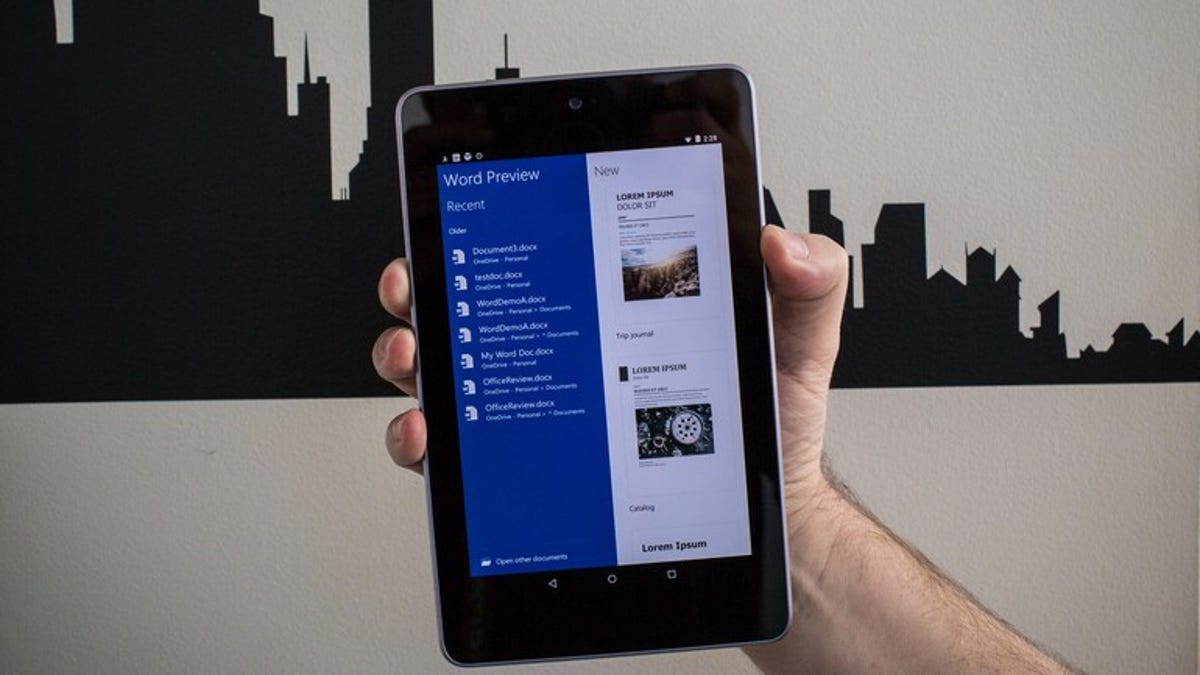
James Martin/CNET
Microsoft just sharpened its software sword against Google on the search giant’s own platform.
Windows productivity and collaboration apps, like its Skype messaging service, will now be found on the home screen when people buy some Dell devices running Google’s Android mobile operating system starting later this year, Microsoft announced Monday. Those apps include Skype and others like its OneDrive Internet-storage service and OneNote writing program, alongside mainstays like Word, Excel and PowerPoint.
Microsoft also said it brokered a new set of partnerships with smaller, regional device makers spanning multiple continents and large markets like Russia, Germany and Pakistan. All eleven of the deals will extend to business and consumer versions of the apps, giving companies the option of purchasing bundles that allow the software to be used across various platforms.
Microsoft executives ultimately hope that getting more people using its apps will pull consumers away from other free alternatives, like Google’s suite of Web apps preloaded on almost every Android device in the world, which totaled more than 1 billion shipments last year alone.
Meanwhile, sales of Microsoft’s cash cow, its Windows and Office software for PCs, are slowing as free alternatives and cloud services become more popular. Microsoft in January said in response that its next operating system, Windows 10, will be free upgrade for a majority of current Windows users while it continues making the process of using its software on other devices easier. Eventually, Microsoft hopes, consumers will move onward to the products Microsoft can charge money for like its Office 365 subscription service, which charges for access to its productivity apps across devices.
Since chief executive Satya Nadella took over last March, Microsoft has taken a radically different approach to its flagship software. Instead of hiding it behind price tags and the Windows operating system, the company has begun giving it away for free — and even on competitors’ devices.
“For Microsoft, this is part of the company’s mobile-first, cloud-first vision,” said Peggy Johnson, the company, Microsoft’s executive vice president of business development, in a statement. “We’ve proven that we’re not afraid to look outside ourselves to reinvent ourselves.”
Included in the roundup is an expansion of Microsoft’s deal with Samsung to preinstall Windows apps on the company’s devices. Now, Office apps like Word, Excel and PowerPoint join OneNote, OneDrive and Skype on some Android-powered tablets made by Samsung. That follows Microsoft’s announcement last month that it would be preinstalling Skype, OneNote and OneDrive on only Samsung’s Galaxy S6 smartphone.
Microsoft is courting third-party device makers at a time when its relationships with those partners have frayed. By developing its own smartphones under the Nokia line and tablets under the Surface division, Microsoft began directly competing with the computer makers who also rely on its software.
“If you’re Lenovo, Acer or Dell, how do you look at a company that wants you to use its platform while doing its hardest to compete with you directly?” said Roger Kay, an analyst and founder of market intelligence firm Endpoint Technologies Associates.
Microsoft even went to court against Samsung when the smartphone maker refused to pay patent royalties, as Samsung cited Microsoft’s acquisition of Nokia’s handset division last April as evidence it had breached their agreement. The dispute was only just resolved last month.
It appears as if Microsoft is making amends through its software deals, though other top tablet and smartphone makers like Sony, Acer and Asus remain out of the equation for now.




